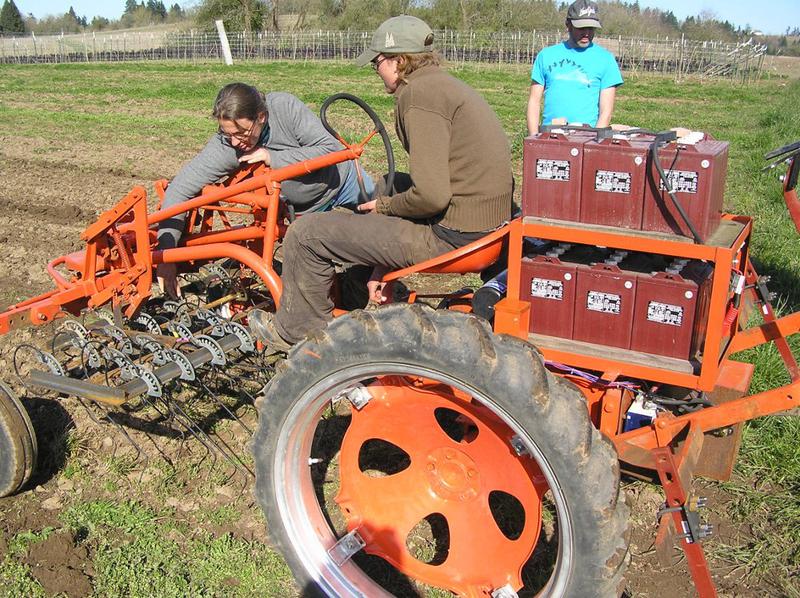FarmHack is a network for sharing open source know-how amongst the distributed fringe of DIY agricultural tech aficionados and innovators. In the same vein as Appropedia or Open Source Ecology, a collaborative digital knowledge-base facilitates the harvest of crowd wisdom to address challenges and inefficiencies in modern ecological (and economical) farm operation. It is a project of Young Farmers Coalition and somewhat angled to the exuberant and tech-savvy eco-preneurial demographic, but inclusive and supportive of all open earthy inhabitants.
A primary focus of the organization is toward intensive development meet-ups, teach-ins, and hackathons, in person, on the farm. Just after landing at my new rural summer farm home and hack-factory in Vermont, I learned of one such get-together nearby on Lake Champlain. It appealed as a chance to meet peers, learn about the local Intervale organic agricultural enterprise collective, and practice some “agile” collaborative protocols in fresh context.
[image_1_big]Close to 30 attendees converged from across New England, bearing pedigrees ranging from electrical engineering to graphic novel artist. The design charrette on day one is built around the simple rules of Open Space: it’s a “vote with your feet” affair, not about pitches or prescriptions. Tap right into passion and aptitudes–no hiding behind would’s, should’s, maybe’s or can’ts. The aim is to optimally, emergently, synchronize diverse skills and perspective around a shared goal or inquiry. It’s a subtle but profound shift from the usually passive “conference” mode of received wisdom and narrow charismatic leadership. You’re invited to dig in to the gifting, and challenged to compile all the feedback that is generated, for swift joint iteration of process and product.
According to the digital brochure, the focus for the Champlain weekend is appropriate tillage, CAD design, workshop configuration and use, and working with FarmHack’s new community website. Special bonus features included a converted silo home tour, grange hall hay-bed slumber party, several farm excursions, and, tacked on ahead of things the night before, a talk and book signing with The Greenhorns founder, author, and film-maker Severine Fleming, with whom I shared my own “startup” farm experience a dozen years back on campus at Pomona College in California.
[image_2_big]We were first treated to a tour of the Intervale Center, and the predominantly “hacked” implements and equipment of its Farmers’ Cooperative, such as automated greenhouses, root vegetable washer (designed in conjunction with University of Vermont engineering students), salad greens dryer (Amana brand washing machine uncased and set to spin), four-barrelled flame-throwing weed exterminator, and electric tractor-to-be. Use of these is on a per-hour honor system basis, with a proportional pooled fund (plus lots of good-natured volunteer effort) to cover maintenance, repairs, and new purchase. It’s effective, productive, and proliferating (link is an “idea worth sharing” pdf pamphlet on farm equipment co-ops from University of Sasketchewan Center for the Study of Cooperatives).
Rural areas–so many in stark economic decline today–are in fact a wealth of raw materials, practical skill, and entrained devotion towards creative repurposing and sustainable initiative. Some of the best comfort and satisfaction about life on and with a piece of land, is that there is always plenty to “do;” to explore, to evaluate and improve upon, to hack away at in a mechanical or strategic manner–with room for creativity and eclectic flair–leading directly to concrete (frequently delicious and/or nutritious) result.
[image_3_big]The vocation of farming may seem a bit rugged or romanticized in the mind of a supermarket sub/urbanite today, but in this impending agrarian renaissance there is ample room for sophisticated artistry and improvisation to complement or perhaps supersede traditionally off-grid / offline perseverance at day-long denim drudge-work. Innovation and inspiration are accruing as a public resource in tech-focused sites like FarmHack, and also in venues for experiential wisdom and narrative story content, such as The Greenhorns or even Cowbird.
Interoperable semantic metadata of the “next-gen” Web promise unprecedented access to the backstory on your breakfast, options for investment in a craft producer, or the schematics for a solar chicken tractor. Consider, on a neighborhood level, the rise of tool libraries or coworking, and then continue extrapolating towards shared production commons of renewable power and water systems, urban food forests, processing facilities, marketing associations and…well, share the dream– #inhabit; wherever your roots stake hold!
[image_4_big]Were there any big breakthroughs from our weekend encounter? New alliances? Fond memories? Did we manage to iteratively live-work-hack-learn-create lasting autonomy from sclerotic food-oil-industry complicities? Some outcomes: SMS-enabled Arduino greenhouse monitor, mechanical improvements to the root vegetable washer based on cumulative user feedback, scoping for a Zigbee mesh GPS tracking system on farm assets, and notes on effective workspace setup. Following wrap up presentations, emphasis was again placed on documenting to the wiki and continuing the conversation online and in-lab. What was the highest value of this co-location and face-time? Bonding for future collaboration and mutual resourcing…harnessing the greater-sum motivation of teams…meshing diverse work styles and perspectives…seeing and hearing success stories from ag-improv veterans…evaluation of proposals and results by trusted peers…enjoying excellent complementary repast…feeling at home and at one in “serious play” on the farm.
Commercial crop production and domestic animal management is intensely context-sensitive and dynamic vocation. It’s frequently demeaning and discouraging. It’s relatively crap pay. And, it is occasionally a paramount satisfaction returned for gritty labors in the public interest that are literally life-giving. Sustainable food systems are the long-range engine and “money supply” of our civil society. Open sourcing the know-how and effective story lines of successful ventures within this realm will invite citizens back into the processes and rewards of collaborative solving for abundance, ecology, community, and culture.









